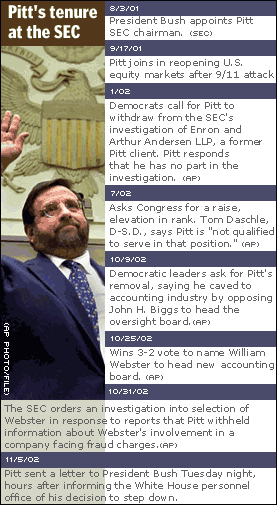NEW YORK (CNN/Money) -
Embattled Securities and Exchange Commission Chairman Harvey Pitt, under fire for not taking a strong enough stand on cleaning up corporate accounting problems, has resigned.
Pitt fell out of favor with the White House in recent days because he withheld controversial information about his hand-picked choice to head a new accounting oversight board.
Pitt sent a letter to President Bush Tuesday night, hours after informing the White House personnel office of his decision to step down.

"Unfortunately, the turmoil surrounding my chairmanship and the agency makes it very difficult for the commissioners and dedicated SEC staffers to perform their critical assignments," Pitt's letter said. "Rather than be a burden to you or the agency, I feel it is in everyone's best interest if I step aside now, to allow the agency to continue the important efforts we have started."
One senior administration source said it became clear "within the past 72 hours or so" that Pitt was considering resigning, and "while I wouldn't say he was pushed, there was no one here encouraging him to hang in there, either."
Senate Minority Leader Trent Lott, R-Miss., who is again in position to become majority leader with the Republicans recapturing the Senate Tuesday, said "In the end, he [Pitt] did the right thing."
"You have to have someone in that position that people have confidence in," Lott said.
Replacement uncertain
New York Attorney General Eliot Spitzer, a Democrat who has taken a leadership role on the corporate corruption issue, said he was somewhat surprised by the timing of the resignation. He said he only hoped that a new chairman is named quickly.
| 
| |

| 
| 
|

|
 CNN's Tim O'Brien takes a closer look at Harvey Pitt's resignation and possible successors. CNN's Tim O'Brien takes a closer look at Harvey Pitt's resignation and possible successors.
|
|
Play video
(QuickTime, Real or Windows Media)
|
| 
|

|
|
"I think the investment community, consumers, the investment houses themselves are anxious to get resolution here," Spitzer told CNNfn. "So the faster we can fill that void and get closure on this, the better."
But a senior White House official told the Associated Press Tuesday that Bush won't have a replacement immediately, adding that Senate confirmation of a nominee is expected to be difficult in the intense political climate.
Speculation on possible replacements centers on former New York City Mayor Rudolph Giuliani, outgoing Oklahoma Gov. Frank Keating and Frank Zarb, the retired chairman of the National Association of Securities Dealers, as well as a number of former SEC officials.
| 
| |

| 
| 
|

|
 Harvey Pitt comments on his resignation as he departs his home on Wednesday morning. Harvey Pitt comments on his resignation as he departs his home on Wednesday morning.
|
|
Play video
(QuickTime, Real or Windows Media)
|
| 
|

|
|
Sen. Richard Shelby, the Alabama Republican poised to become chairman of the Senate Banking Committee and whose criticism of Pitt over the weekend eroded his previously solid Republican support, said Tuesday: "The process of what happened and how it happened was very troubling, and I think it tainted the whole situation."
To replace Pitt, the White House must find someone who is "able, experienced and above reproach," Shelby told Associated Press.
Withholding information on Webster cost Pitt his job
The final straw at the White House was Pitt's decision to withhold from the White House and fellow SEC commissioners the fact that William Webster, the head of the new accounting oversight board, had been involved in an accounting related controversy in his role as head of the audit committee at U.S. Technologies, a Washington, D.C.-based Internet investment firm.
Webster was part of a decision to fire the firm's outside accountants after they questioned company practices. The company, near insolvency, is being sued by shareholders and, according to news reports, is the subject of a criminal investigation.
Pitt knew of Webster's role in the accounting controversy but did not tell fellow commissioners before they ultimately voted to install Webster in the new position, which was created by Congress in the wake of the Enron and WorldCom accounting scandals.
Webster was appointed by a bitterly divided SEC, with three Republican members voting for him and two Democrats voting for John Biggs, a teachers' pension fund administrator. Biggs was opposed by some leading accounting executives who believed he would advocate tough regulation of the industry.
Webster also could follow Pitt in resigning. He told CNNfn that he would step down if he decides he can't be effective heading the new board, which plans to meet for the first time Nov. 13.
"It's an awkward position for me," he added.
Pitt received relatively little praise Tuesday night and Wednesday following his announcement. But one positive comment came from the Securities Industry Association, a group of 600 brokerages and securities firms.
"We should not lose sight of the tremendous accomplishments that he and his staff have achieved over the past 15 months," Marc Lackritz, the group's president, said.
"Following the attacks of Sept. 11, the agency's staff under Chairman Pitt's leadership worked very effectively in coordinating the prudent, quick reopening of financial markets with securities firms, the self-regulatory organizations and the industry utilities. The SEC also acted aggressively against some of the greatest examples of corporate malfeasance that this country has ever seen -- WorldCom, Enron, and Adelphia."

from staff and wire reports
|

